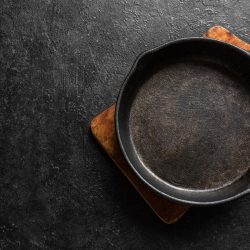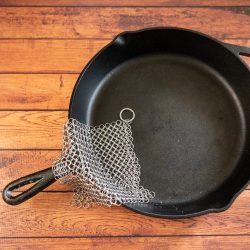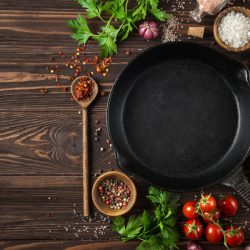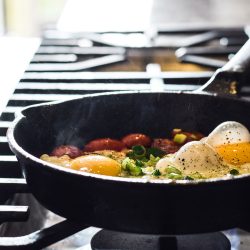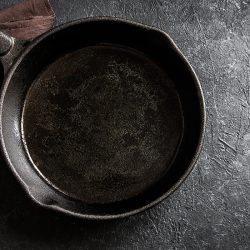Cooking eggs should be a simple task. But, we can't get everything perfect all the time. After countless mistakes, you might start reconsidering your choice in pans. Do they make a difference? If you're looking for the best pans to cook eggs, let's take a look at what others have to say!
To choose the best pan for cooking eggs, you'll need to look for a few specific features. The pan will need to be non-stick, have good heat conductivity, and be easy to clean up. So, this leaves us with a few options—and some will need oil to make the process work smoothly. The best pans to cook eggs in are in the following order:
- Non-stick
- Stainless steel
- Cast iron
Now that you have an idea of which pans to use, you might want to know additional information. For example, why do pans need the features mentioned above to cook eggs? And, since things never go according to plan, we'll also go over some tips to help avoid the dreaded situation—sticky eggs. If you'd like to learn this and more, keep reading ahead.
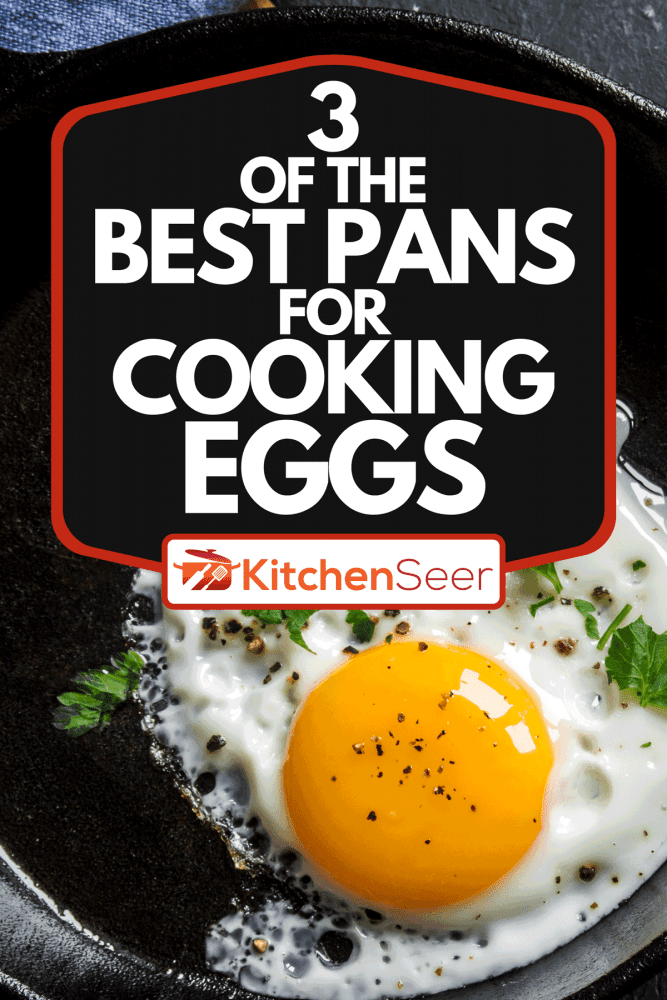
What To Look For in a Pan
Before we go over the best pan to work with, we'll have to smooth over the details. What makes a pan good enough to cook eggs?
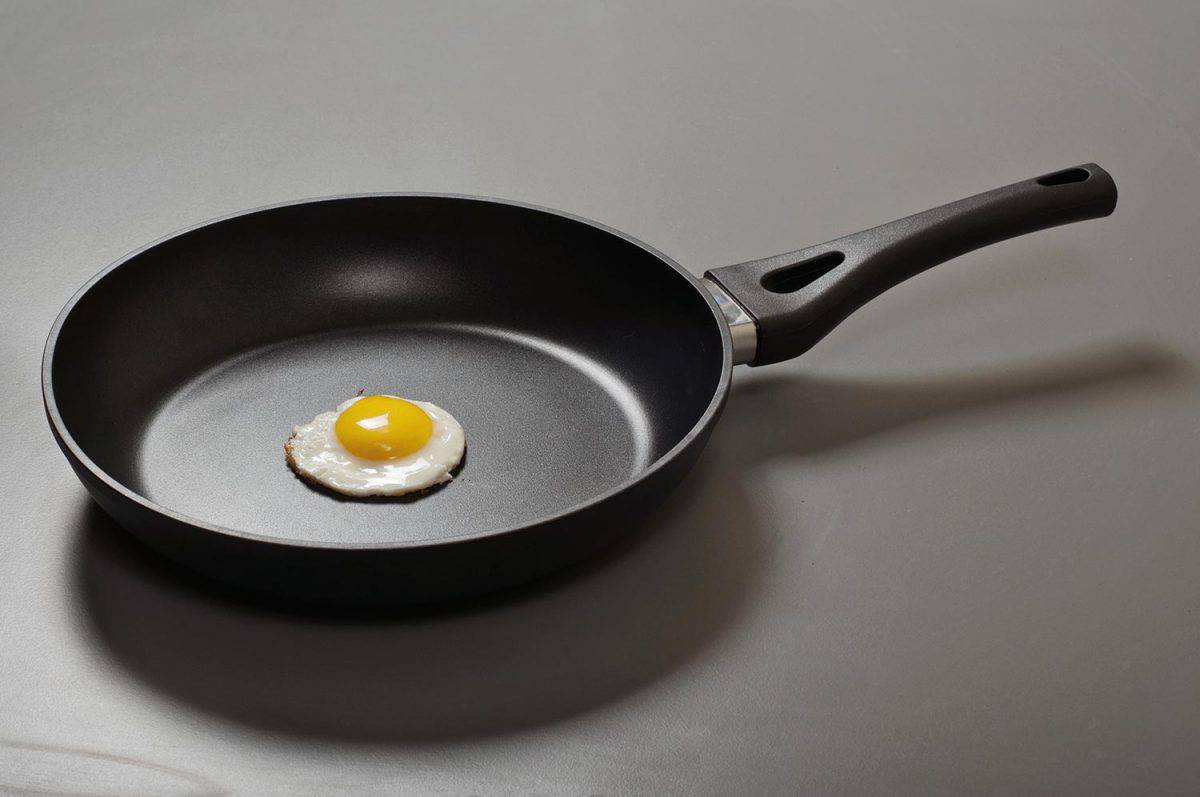
Even-Heat Distribution
The first factor that makes or breaks a pan is how it performs over the flames. Is it prone to develop hot spots? If you're not familiar with the term, a hot spot is an area where the pan tends to be hotter.
As you can guess, a hot spot isn't ideal if you're trying to cook eggs. The reason is that cooks cook relatively quickly. And, if one side of the pan is hotter than the other, you'll end up with burnt and undercooked sides. In addition, this leads us to another problem - the cleanup.
Easy Cleanup
We're all familiar with the experience of cooking eggs for the first time. For some of us, the cleanup after scared us from doing it again. You might be familiar with the dreaded feeling as you scraped the burnt pieces off your favorite pan. And, if you managed to cook it successfully, it still tends to stick onto the pan.
For this reason, you want a pan that offers a non-stick surface. This feature removes the headache of having to clean up the leftover bits. Along with a non-stick coating, you also want to make sure it's a durable one. Meaning, it won't get scratched and peeled easily by cooking utensils.
Weight
Now we're slowly moving into the less essential features. Weight is another factor that you should consider if you're going to flip the eggs without using utensils. When you're going for the flip, you wouldn't want a heavy pan. Instead, you want one that holds itself steady on the stove. Additionally, it shouldn't put any strain on your wrist when you go for the flip.
Size
Lastly, the size of the pan only matters if you're planning to cook a lot of eggs regularly. When cooking for large groups, settle for a pan with a big cooking surface. Another aspect to note is the surface.
Refrain from getting a curved pan. It can hinder the way the eggs cook. So, go for a pan that has a flat surface. This way, you can ensure it cooks evenly.
If you cook only for yourself, you can opt to go for specialized egg pans.
Click here to see this non-stick egg pan on Amazon.
The Non-Stick Hero
Using the information above, we can conclude that a non-stick pan is the most suitable for cooking eggs. Some manufacturers make durable coatings that can withstand hits from cooking utensils. Additionally, the non-stick coating will do better in combination with oil to get things going smoothly.
If you've noticed, we mention that non-stick will do better in combination with oil. The reason is that - even with the non-stick label - the eggs might still stick to the pan. They would do this for several reasons. As one manufacturer suggests, a non-stick pan sticks when:
- Using high heat
- Using aerosol cooking sprays
To get the most out of the pan, you should only use low-medium heat. And, instead of using cooking sprays, you should use alternatives like olive oil, peanut oil, coconut oil, butter, and margarine. All in all, these restrictions are good enough for cooking eggs.
Is Stainless Steel Good for Cooking Eggs?
But what if you want to cook eggs right away. And, all you have is a stainless steel pan. Will you find success in cooking eggs with it? The short answer is yes. But, it will require more effort on your part.
Cooking eggs on a stainless steel pan leaves more room for error. If you don't heat the pan properly, you'll revisit the experience of having to remove bits of burnt egg. Additionally, you'll need to work with a type of lubricant to allow the eggs to move freely on the pan. As mentioned above, you will need the help of something like olive oil, peanut oil, coconut oil, butter, and margarine.
To make the perfect eggs on a stainless steel pan, you'll need to know when it's time to add in the oil. So, we'll include a YouTube video demonstrating the perfect time to add it in:
Once you've added the oil, you're free to add in the eggs. It should work similarly to a non-stick pan.
Are Cast Iron Pans Good for Cooking Eggs?
Last on the list we mentioned is cast iron. You should only use a cast iron pan if you're willing to put in a lot of effort. Meaning, you'll likely have to practice a lot of times before getting it down perfectly. Regardless, we'll go over some recommendations from others to ensure your attempt goes successfully.
- Just like a stainless steel pan, you'll want to preheat a cast iron before adding in the oil. Though, cast iron takes a while to heat up. Leave the stove on low or medium heat for 5-10 minutes.
- When it's hot enough, you can move along and add your choice of oil. This way, you ensure you have a lubricant for your eggs.
- For your last step, you can add the eggs. However, you'll want to turn the heat down. While cast irons don't heat evenly, they do retain heat well. The heat from the preheating session will do most of the work.
Of course, it's always easier said than done. So here is a video about cooking an egg on cast iron:
Why Do My Eggs Keep Sticking to the Pan?
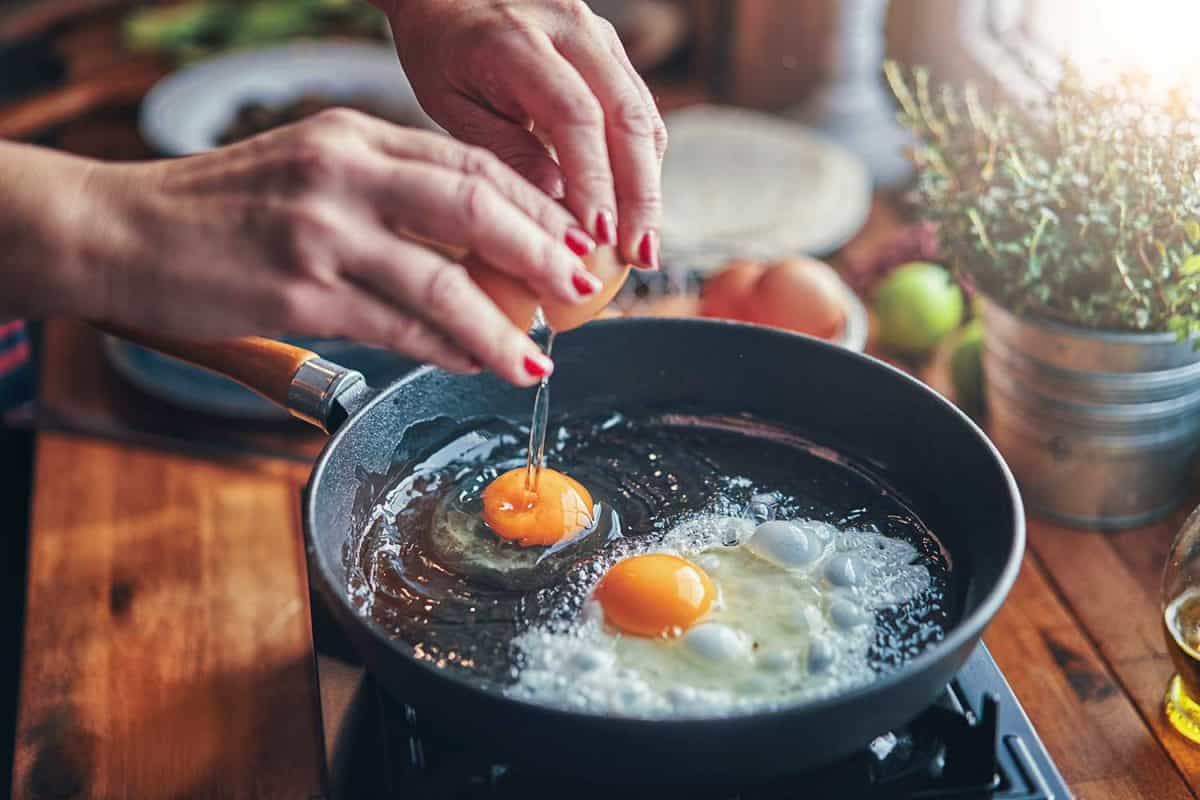
When you're cooking eggs, there a several factors to keep in mind. If you neglect one of them, you'll be more likely to end up with a disaster. If you've tried endlessly to cook eggs with no success, let's go over some of the variables you might have missed.
As some suggest, the first mistake you might've committed is cooking eggs on a cold pan. Unless you're cooking on a non-stick pan, you'll want to heat your pan of choice properly. If you don't hear a sizzle when you put in the eggs, the pan might've not been hot enough.
Additionally, you will need a lubricant to help reduce the chance for the eggs to stick. Without them, the proteins in the egg will form chemical bonds with the metal of the pan. A non-stick pan has a coating to prevent this from happening.
Pans without a non-stick coating will need further help to disrupt this process. So, the use of fats like oil and butter is necessary. The oil will get in the way of the proteins and the surface.
How Do You Keep Eggs From Sticking to the Pan Without Butter?
If you're looking to reduce the calories, you might want to avoid using butter. However, is it possible to prevent eggs from sticking to the pan without it? Your experience will vary.
Some forum users suggest using a light coating of oil. If you want to avoid using fats completely, you can try cooking eggs on a non-stick pan without them. Still, some pans are not non-stick entirely. So, you might experience a bit of sticking.
Aside from that, you'll likely have to try alternative methods. If you must avoid using fats, you can also try to microwave the eggs.
How Many Eggs Fit in an 8-Inch Pan?
The amount of eggs that fit in an 8-inch pan depends on what you want out of them. Some cooks suggest only using two eggs for it. In other people's experience, the most they could fit would hover around 2-4 eggs. So, unless you're cooking for a large group, an 8-inch pan should suit your needs.
Final Takeaway
Like most dishes, it takes time and practice to make the perfect eggs. When you're working with the ideal tools for the egg, you're more likely to succeed in your endeavor! We hope you found the information above helpful!
Before you go, do you have other egg concerns? Are you concerned with calories? If you'd like to know how many calories frying an egg adds, check out our post - Does Frying An Egg Add Calories?
Are you looking for other ways to cook eggs? Do you own a ramekin? You can learn more about cooking eggs in them in our post - Can You Cook Eggs In A Ramekin? Until next time!


